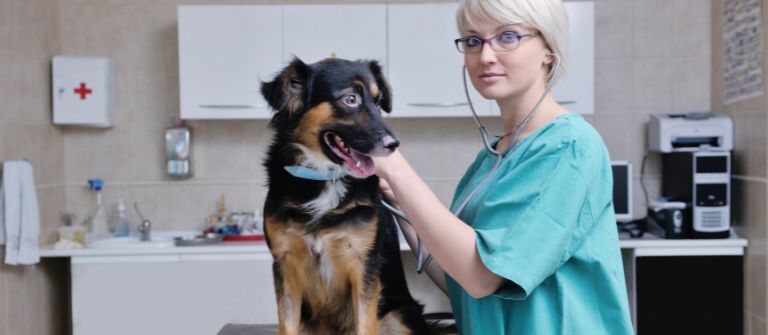Veterinarians and their staff are critical for ensuring the health of animals, whether they be household pets or farm animals. Unfortunately, recent veterinary staff shortages are creating several difficulties for veterinary professionals. According to the National Institute of Food and Agriculture, most states in the United States are experiencing a veterinarian shortage in at least one area.
Why is There a Veterinary Shortage?
The U.S. Bureau of Labor Statistics (BLS) projects that over 40,000 new veterinarian jobs will open by 2030, and over 150,000 vet tech positions will open up before the decade’s end. These staggering numbers correspond to shortages across thousands of veterinary clinics. Several factors impact veterinary staff shortages, including:
- Retirement of older veterinarians: The U.S. Census Bureau recently reported that by 2030, all people in the baby boomer generation would be at least 65 years old. Although research indicates that baby boomers are staying in the workforce at higher rates than previous generations, they will eventually retire. As veterinarians and vet techs retire, clinics need new staff to replace them.
- High turnover: High veterinary staff turnover may significantly contribute to the shortage. According to the American Veterinary Medical Association (AVMA), the turnover rate for veterinarians is higher than that for physicians. Dissatisfaction with working conditions could motivate veterinarians to leave. For example, the AVMA found that about 30% of veterinarians who worked with companion animals wanted to work fewer hours. Considerations like these could motivate veterinarians to find work elsewhere.
- Increased demand for care: Certain emerging veterinary industry trends like greater access to pet insurance, longer average lifespans of pets, and increased demand for veterinary services have strained the capabilities of veterinary clinics.
The Implications of Staff Shortages in the Veterinary Industry
A lack of sufficient staffing is a considerable obstacle that could impact the veterinary profession for a generation. Here are a few of the most significant implications of the veterinary staff shortage you should know:
Animal Welfare Implications
As with medical professional shortages, a shortage of veterinary professionals will negatively impact animal welfare. Animals of all kinds need routine medical care to maintain their health. Just as with humans, regular vet checkups can help prevent more severe issues, and receiving care during illness can get an animal back on its feet.
Specifically, veterinary health issues are a significant risk factor for owners relinquishing their pets to a shelter. When people cannot provide for their animals’ physical well-being, they may be forced to put them in a place where they may eventually be euthanized. Additionally, stray animals or animals that have experienced abuse might not be able to receive the care they need when brought to a vet.
Considering the wealth of care veterinarians and vet techs provide, animals without veterinary care may be expected to develop more health issues and experience shorter life spans. The inability to receive care makes it impossible for people to maintain their animals’ health.
Public Health Implications
Staff shortages in the veterinary industry can have implications for public health. For example, sufficient veterinary care may help prevent animals from spreading certain infections like cat scratch disease to humans. Taking pets to receive regular veterinary care is essential for maintaining the owner’s health.
Animals also provide important benefits to people, from reducing stress to helping people maintain an active lifestyle. Many view their bonds with their pet as one of their most treasured relationships. Without adequate veterinary care for their pets, some individuals may be forced to give their pet to a friend or surrender it to a shelter.
Animals provide more than companionship — service animals often perform life-saving services. People who need assistance or emotional support animals receive benefits that improve their physical and mental health. Keeping service and support animals healthy benefits the people whose lives they protect.
Veterinarian Wellbeing Implications

A shortage of staff in the veterinary profession makes work more difficult for current staff members. Inadequate staffing levels require existing staff to shoulder more of the responsibility of the daily operations of a veterinary clinic. These tasks may include:
- Examining and assessing animals
- Cleaning the clinic
- Collecting specimens and samples
- Working in the veterinary clinic laboratory
- Assisting with surgery and preparing animals for surgery
- Performing procedures
- Meeting with and educating pet and animal owners
The well-being of a veterinary team is a top priority so that teams can work more efficiently together. When a clinic experiences a significant staff shortage, all of the above tasks become more difficult to accomplish in a timely manner. The well-being of the animal care teams in clinics across the country may suffer as a result.
Ultimately, short staffing creates a negative cycle. Having less staff produces additional stress and a harsher work environment, which could motivate people to look for other employment. Although new veterinarian and vet tech students are graduating and entering the industry, the growth isn’t enough to curb the issues many veterinary clinics are facing because of the shortage.
Business Implications
As veterinarians and vet techs suffer from a staffing shortage, so do their clinics and business operations. Veterinary clinics need staff to operate and provide high-quality services. Having adequate levels of staff allows teams to work together better and increases productivity.
A recent increase in clients isn’t helping the situation, despite the seemingly positive influx of revenue. Data suggests that veterinary clinics are handling a higher number of appointments, seeing increased demand for veterinary services and products, and experiencing increased spending on higher-value services. While existing clients may contribute most of a clinic’s heightened demand, the growth is still challenging for many clinics to manage with a staff shortage.
How Rectangle Health Can Help Veterinary Clinics
Determining strategies for dealing with the veterinary shortage is one of the largest challenges clinics face today. Clinics need ways to boost efficiency even as they deal with a lack of staff. Fortunately, there are many solutions veterinary clinics can implement, including plans to boost staff satisfaction and support veterinary programs at local universities.
Another answer is to utilize the available digital tools for veterinary clinics that can help improve productivity. At Rectangle Health, we provide veterinary clinics with a payment collection system that enables more efficient bill delivery and payment collection. Another patient care solution is our patient financing solution. Patient financing is a non-recourse patient financing arrangement that provides nearly 100% approval*, so your veterinary clinic can help more patients without any financial risk to your practice.
Our technology solutions enable easier communication with your clients through text-to-pay, card-on-file payment processing, online payments, financing programs, and more. These solutions help your clinic provide the best care for animals and their owners.

Rectangle Health Can Help Veterinarians Increase Profitability and Office Efficiency
Veterinary staff shortages will likely continue for several years, causing issues in providing adequate healthcare to your clinic’s patients. Pet owners, veterinary staff, and clinics are also impacted by the shortage. Equipping your veterinary clinic to face these challenges can give your business the means to adapt and meet new demands.
Rectangle Health is a financial technology company that provides software solutions to increase healthcare office efficiency and improve the patient experience. We understand the challenges your office faces and have developed solutions to give your operations the tools for greater productivity. Our Practice Management Bridge® work and cash flow platform provides numerous features that simplify your practice, from digital payment technology that gives your clients an easy way to pay expenses to our patient financing solution.
Our system integrates with your current practice management software for easier payment tracking and patient communication across your organization, no matter its size. This proprietary healthcare technology platform provides your office and clients with the convenience of automation and flexibility.
* The patient financing program provides nearly 100% approval. Applicants determined to be in Open Bankruptcy, Fraud Alert or on the Terrorist Watch List during the application process will be declined. Patients covered by government payor programs for a procedure are not eligible for financing of that procedure. Government payer programs include Medicare, Medicaid, the State Children’s Health Insurance Program (SCHIP), the Department of Defense TRICARE and TRICARE for Life programs (DOD TRICARE), the Veterans Health Administration (VHA) program, and the Indian Health Service (IHS) program.



